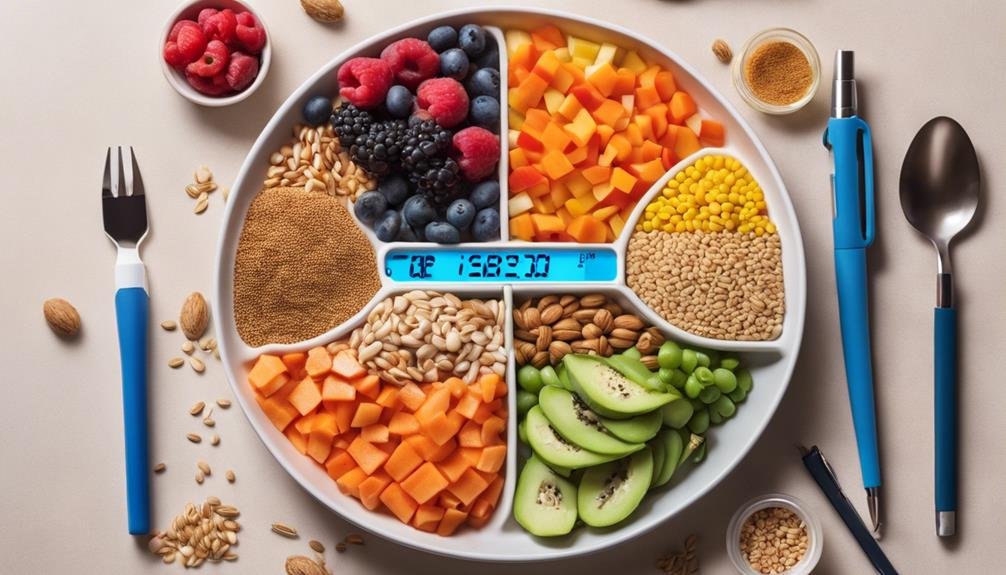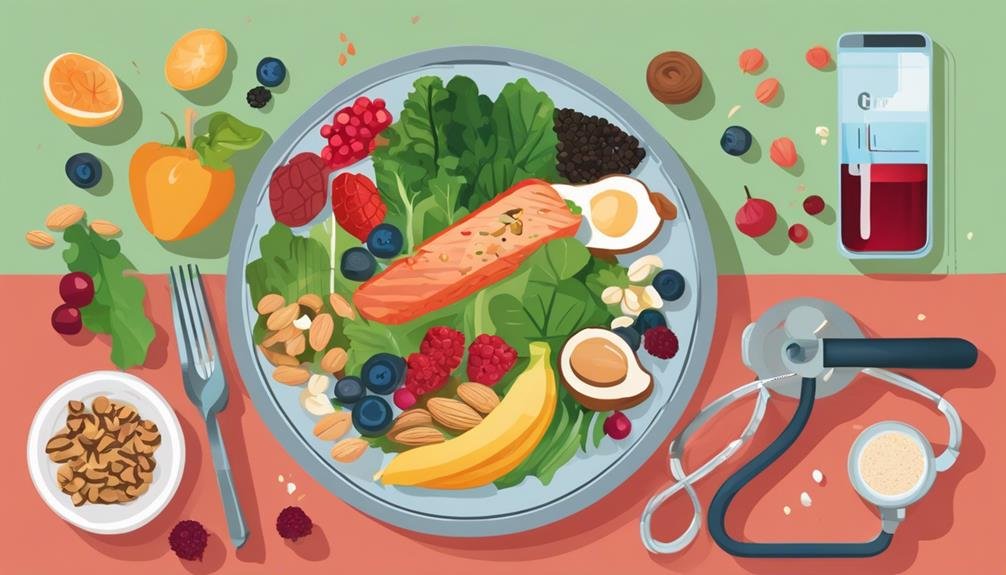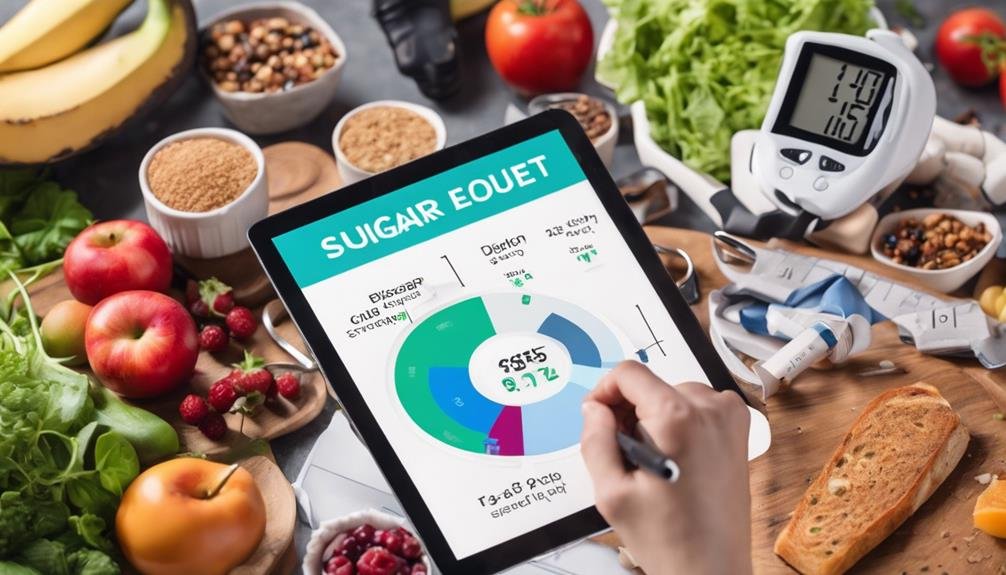Imagine your body as a finely tuned instrument that requires the right notes to play a harmonious melody. When it comes to managing diabetes, your diet acts as the conductor, guiding your body towards better health.
But how do you orchestrate a diabetes diet plan that can potentially reverse symptoms and improve your well-being? Let's explore the key steps and strategies that can help you navigate this complex yet important journey towards a healthier you.
Key Takeaways
- Balance nutrients with whole grains, lean proteins, and healthy fats for stable blood sugar.
- Monitor food variety, portion sizes, and meal timing to manage diabetes effectively.
- Choose complex carbs, non-starchy vegetables, lean proteins, and healthy fats for diabetes-friendly meals.
- Track blood sugar levels, adjust food choices, and practice portion control for better diabetes management.
Understanding Diabetes and Nutrition

When managing diabetes, understanding the relationship between your nutrition choices and blood sugar levels is important for maintaining excellent health. Managing blood sugar levels effectively involves achieving a delicate balance of nutrients in your diet. Carbohydrates have the most significant impact on blood sugar, as they're broken down into glucose during digestion. Choosing complex carbohydrates such as whole grains, fruits, and vegetables can help regulate blood sugar levels more effectively than simple carbohydrates like sugary snacks.
Protein is essential for stabilizing blood sugar levels as it slows down the absorption of glucose into the bloodstream. Including lean sources of protein like poultry, fish, tofu, and legumes in your meals can support better blood sugar control. Healthy fats, such as those found in nuts, seeds, and avocados, play a role in managing blood sugar by improving insulin sensitivity.
Monitoring your nutrient balance by incorporating a variety of foods rich in carbohydrates, proteins, and fats can help you maintain stable blood sugar levels and overall health.
Assessing Your Current Eating Habits
Assess your current eating habits by analyzing the types of foods you consume daily and their impact on your blood sugar levels. Understanding your eating patterns is vital for making informed decisions about your diet.
Here are some key points to take note of:
- Variety of Foods: Take note of the variety of foods you eat. Are you incorporating a diverse range of fruits, vegetables, whole grains, lean proteins, and healthy fats into your meals?
- Meal Timing: Pay attention to when you eat your meals and snacks. Do you have long gaps between meals, or do you graze throughout the day? Consistency in meal timing can help stabilize blood sugar levels.
- Portion Sizes: Evaluate the portion sizes of your meals. Are you overeating or consuming appropriate portions? Understanding portion control is important for managing blood sugar levels effectively.
Conducting a nutritional analysis of your current eating habits will provide valuable insights into areas where adjustments may be necessary to support your diabetes management goals.
Identifying Diabetes-Friendly Foods

An important aspect of managing your diabetes is recognizing which foods are beneficial for regulating your blood sugar levels. When identifying diabetes-friendly foods, it's essential to focus on choosing alternatives that are low in added sugars, saturated fats, and refined carbohydrates.
Opt for whole grains like quinoa, brown rice, and oats instead of white bread and pasta. Include plenty of non-starchy vegetables such as spinach, broccoli, and bell peppers in your meals to add fiber and essential nutrients without causing spikes in blood sugar levels.
Additionally, lean protein sources like skinless poultry, fish, tofu, and legumes can help maintain steady blood glucose levels. When meal prepping, consider incorporating healthy fats from sources like avocados, nuts, and olive oil to provide sustained energy and promote heart health.
Snack on fruits like berries, apples, and citrus fruits instead of sugary treats for a sweet fix that won't lead to rapid blood sugar fluctuations. By making mindful choices and planning balanced meals, you can effectively manage your diabetes and improve your overall well-being.
Planning Balanced Meals and Snacks
To create a well-rounded diabetes diet plan, focus on carefully balancing your meals and snacks with a variety of nutrient-dense foods. When planning your meals and snacks, consider the following:
- Meal Timing: Aim to space your meals evenly throughout the day to help regulate blood sugar levels. Consistency in meal timing can assist in managing diabetes effectively.
- Carb Counting: Pay attention to the amount of carbohydrates in your meals and snacks. Monitoring your carb intake can help control blood sugar spikes and dips, promoting stable energy levels.
Monitoring Progress and Adjusting as Needed

When monitoring your progress in managing diabetes through your diet plan, be diligent in tracking your blood sugar levels regularly and adjusting your food choices as needed based on the results. Tracking changes in your blood sugar levels can provide valuable insights into how your body responds to different foods. Keep a detailed record of what you eat and how it affects your blood glucose readings. Look for patterns and make adjustments accordingly.
In addition to tracking changes in your blood sugar levels, adjusting portions can also play a vital role in managing diabetes. Portion control is essential in regulating blood sugar levels and maintaining a healthy weight. Be mindful of portion sizes and consider using measuring cups or a food scale to ensure you aren't overeating. Adjusting portions of carbohydrates, fats, and proteins in your meals can help you achieve better control over your blood sugar levels. Remember, small changes can lead to significant improvements in managing your diabetes through your diet plan.
Frequently Asked Questions
Can Intermittent Fasting Be an Effective Strategy for Managing Diabetes Symptoms?
Intermittent fasting can indeed benefit managing diabetes symptoms by improving insulin sensitivity. However, it may pose risks for some individuals. Consult with a healthcare provider to determine if fasting aligns with your health goals and needs.
Are There Any Specific Supplements That Can Help With Blood Sugar Control in Addition to a Diabetes Diet Plan?
When it comes to blood sugar control, herbal supplements can be beneficial. Pairing them with a structured exercise routine may enhance their effects. Consult with a healthcare provider before adding any new supplements to your regimen.
How Can Stress and Sleep Impact Blood Sugar Levels and How Can They Be Managed in Relation to a Diabetes Diet Plan?
To manage stress and improve sleep while controlling blood sugar levels, focus on stress management techniques like deep breathing and mindfulness. Guarantee consistent meal timing and monitor blood sugar levels regularly to adjust your diabetes diet plan effectively.
Are There Any Specific Cooking Methods or Techniques That Can Help Retain the Nutritional Value of Diabetes-Friendly Foods?
To retain the nutritional value of diabetes-friendly foods, try cooking techniques like steaming, roasting, or grilling. These methods preserve nutrients better than frying. Remember, "You are what you eat," so choose cooking methods that keep your food healthy.
How Can Social Situations and Dining Out Be Navigated While Following a Diabetes Diet Plan?
When maneuvering social gatherings and dining out while adhering to a diabetes diet plan, you can make informed choices by researching menus in advance, choosing grilled or baked options, and prioritizing vegetables. Meal prep and travel with snacks to stay on track.
Conclusion
Just like a well-crafted recipe, creating a diabetes diet plan requires careful planning and attention to detail.
By understanding the ingredients (nutrients) needed to manage diabetes, evaluating your current habits, and creating balanced meals and snacks, you can reverse symptoms and improve your health.
Remember, just like adjusting the heat on a stove, monitoring your progress and making necessary adjustments along the way will help you achieve success in managing your diabetes through nutrition.